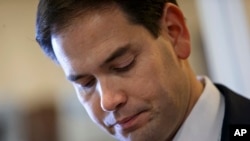U.S. President Barack Obama’s move to normalize U.S. relations with Cuba drew sharp and sharply differing reactions across America’s political spectrum, among Cuban exiles in Florida and from the international community.
While the return of imprisoned American contractor Alan Gross to U.S. soil was universally welcomed, reaction to a thaw in relations between Washington and Havana was decidedly mixed.
Democratic Senator Patrick Leahy, one of three lawmakers who flew to Cuba to bring Gross home, called Obama’s announcement a positive step away from a policy of isolation that failed to drive Cuban Presidents Fidel and Raul Castro from power.
"The fact is, they are there, fact is Cuba is still there," Leahy said. "We ought to face up that we will have differences, but that we can improve the lives of Cubans … by stopping this idea of a closed door. …"
By contrast, Republican Senator Marco Rubio, whose parents came to the United States from Cuba in 1956, called Obama’s announcement "a victory for the oppressive Cuban government, but a serious set-back for the repressed Cuban people."
"The White House has conceded everything and gained little," said Rubio, who will chair a Senate foreign relations subcommittee on the Western hemisphere.
Negotiators "gained no commitment on the part of the Cuban regime to freedom of the press, or freedom of speech, or elections," Rubio said. "No commitment was made to allowing the establishment of political parties or even begin the semblance towards a transition to democracy."
Rubio represents Florida, home to a large and vocal Cuban-American community. Historically, Cuban-Americans have nursed anti-Castro sentiment, but polls show an erosion of support for the U.S. trade embargo – particularly among younger generations – and a growing desire for normalized relations between the two countries.
A Twitter account linked to Texas Republican Senator Ted Cruz asked: "Why is Obama so impatient? We need to give the sanctions some time to work."
Other Senate views
Reaction did not fall entirely along partisan lines. Democratic Senator Robert Menendez, also a Cuban-American and the outgoing Senate Foreign Relations Committee chairman said, "President Obama's actions have vindicated the brutal behavior of the Cuban government."
But Republican Senator Jeff Flake, said renewing ties with Havana should not be seen as a concession to the Cuban government.
That view "is simply wrong," he said. "The policy we have had in place for the past 50 years has done more, in my view, to keep the Castro regime in power than anything we could have done. I am pleased these actions have been taken. I think they will improve the lot of ordinary Cubans, and it is good for Americans, as well."
Obama’s desire to end the U.S. trade embargo on Cuba would require cooperation from a Congress that will be Republican-controlled beginning in January. The topic is likely to be fiercely debated by lawmakers in 2015. At the end of his news conference, Rubio said flatly, "This Congress is not going to lift the embargo."
In Miami, 'collective shock'
In Miami’s exile community, there were similar accusations of betrayal.
"Miami, the heart of the Cuban exile community, reacted with a collective shock," the Miami Herald said of Wednesday’s announcements by Obama in Washington and by Raul Castro in Havana.
"The Cuban exile community that has made a foundation out of standing firm against the Castro government has been, in essence, sold out," Miami-Dade County Commissioner Esteban "Steve" Bovo, a Republican, complained to the Herald.
The paper’s website Wednesday prominently featured a photo of angry demonstrators outside the Café Versailles, a hot spot in the city’s Little Havana neighborhood, bearing signs complaining of an Obama administration conspiracy.
International approval
The plan to restore full diplomatic relations with Cuba drew approval from at least several other countries.
Russia also lauded the measure. “We see this as a step in the right direction. We do not believe that imposing sanctions by the U.S. on whatever country has legitimate basis and legal grounds,” Deputy Foreign Minister Sergei Ryabkov was quoted by the Russian news agency Interfax, according to Reuters.
Germany’s foreign minister, Frank-Walter Steinmeier, applauded the “very good news in these times rich with conflict,” the news agency AFP reported.
Likewise, French Foreign Minister Laurent Fabius cheered "the lifting of the embargo," AFP reported. “France remains by the side of the Cuban people as it enters this new phase in its history."
Venezuela’s president, Nicolas Maduro, hailed the measure as “a gesture of courage” and called it “perhaps the most important step of his [Obama’s] presidency.” Caracas and Washington have had strained relations, with the U.S. Congress voting earlier this month to impose sanctions on Venezuelan officials over free speech violations.
VOA’s Carol Guensburg contributed to this report, which includes information from Reuters and AFP news services.




